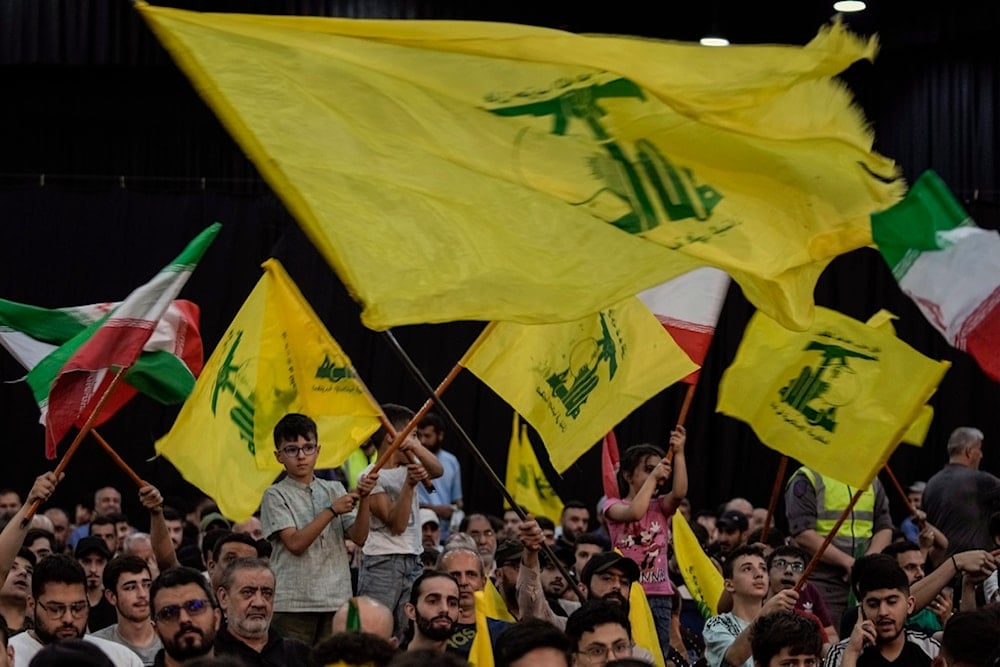US cautions 'Israel' against war in Lebanon even 'limited': Axios
US officials tell Axios that the Biden administration conveyed to "Israel" its view that "a limited war" in Lebanon or a "small regional war" is not a "realistic option".
-

Hezbollah supporters wave Lebanese and Iranian flags as they listen to a speech by Hezbollah's Secretary General Sayyed Hassan Nasrallah, in the southern Beirut suburb, Lebanon, Friday, May 24, 2024. (AP)
US President Joe Biden's administration has recently cautioned "Israel" against the idea of "a limited war" in Lebanon, warning that it could prompt Iran to intervene, Axios reported Thursday, citing three officials; two American and one Israeli.
The news website mentioned that the ongoing confrontations between Hezbollah and the Israeli occupation forces since October 7 have seen a significant escalation in the last couple of weeks, pushing some within the Israeli occupation government and military to advocate for a substantial expansion of the fighting.
Israeli Prime Minister Benjamin Netanyahu said Wednesday that "Israel" was "prepared for a very intense operation" along the border with Lebanon. Finance Minister Bezalel Smotrich has even issued calls for invading and occupying Lebanese territory.
Axios said American and Israeli officials pointed to a growing concern within the Israeli military and the Security Ministry that the situation in Lebanon is approaching "a turning point," with efforts by the United States and France to find a diplomatic solution to ease tensions along the border so far yielding no progress.
According to the website, the Biden administration believes that restoring calm will be impossible without achieving a ceasefire in Gaza.
American officials informed Axios that the Biden administration conveyed to "Israel" its view that "a limited war" in Lebanon or a "small regional war" is not a "realistic option" because it would be challenging to prevent it from escalating out of control.
US and Israeli officials revealed that the Biden administration cautioned "Israel" that even a limited ground invasion of Lebanon, particularly in border areas, would likely provoke Iranian intervention.
The officials said that one scenario discussed by the Biden administration with "Israel" is the potential influx of fighters from Syria, Iraq, and Yemen into Lebanon to join Hezbollah in its battle.
This comes as earlier this week, Hezbollah's rockets and drones sparked large forest fires across northern occupied Palestine that took over 48 hours to extinguish.
The fires, along with mounting public criticism of the Israeli government's handling of the war in the North, prompted an emergency meeting of the war cabinet on Tuesday night.
Axios cited a senior Israeli military official as saying that tensions have been escalating since May, with Hezbollah conducting more successful drone attacks on Israeli targets that were not intercepted.
This echoes the statements of US State Department's spokesperson Matthew Miller, who, on Wednesday, emphasized that Washington remains "incredibly concerned about the risk of escalation" between Hezbollah and "Israel".
"We have been engaged in intense diplomatic conversations and intense diplomatic negotiations to try to avoid that conflict from escalating beyond control," Miller said, claiming that "Israel" has consistently expressed its preference for a diplomatic solution.
The US official warned that an escalation "would lead to further loss of life from both Israelis and the Lebanese people and would greatly harm Israel's overall security and stability in the region."
According to the senior Israeli military official, no decisions were reached at the War Cabinet meeting, but the Israeli army presented several options for stretching the confrontation, including a ground invasion aimed at reportedly pushing Hezbollah's Radwan force away from the border.
The Israeli official emphasized that since October 7, the army's orders from political leaders have been to prioritize eliminating Hamas in Gaza and avoiding war in Lebanon, warning that altering this policy could have major consequences.
Read more: The existential threat Hezbollah poses on 'Israel'; a striking reality

 4 Min Read
4 Min Read








